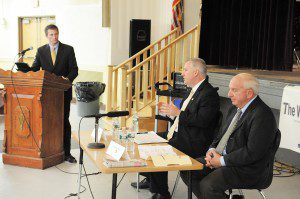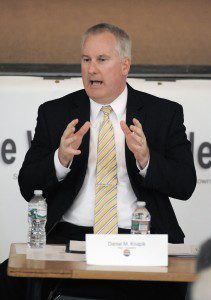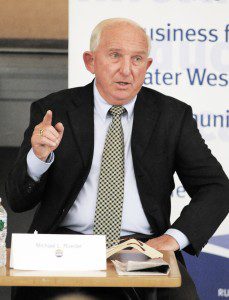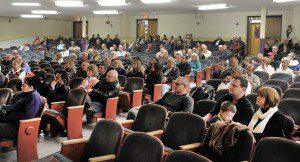
Patrick Berry, left, owner and president of The Westfield News Group, served as moderator for the Mayoral Candidate Forum between Westfield Mayor Daniel M. Knapik, center, and candidate Michael L. Roeder, sponsored by The Westfield News Group and The Greater Westfield Chamber of Commerce at Westfield Vocational-Technical High School last night. (Photo by Frederick Gore)
WESTFIELD – The two mayoral candidates laid out their respective platforms last night during a public forum attended by close to 150 people at the Westfield Vocational-Technical High School auditorium and sponsored by the Greater Westfield Chamber of Commerce and the Westfield News Group.
The candidates, incumbent Daniel M. Knapik, and challenger Michael L. Roeder, made it clear during the 90-minute session that they each have very different approaches to governing the City of Westfield.
Knapik said city residents have the option “of two very different visions of the city’s future” in his opening remarks, then described city accomplishments while in office during “the worst recession since the Great Depression.”
Those accomplishments include a long “to-do” list of improving standard test scores in the city’s school district, building repair, capital equipment acquisition and dealing with five natural disasters while in office.
Knapik said he will continue to invest the city’s financial resources in future projects, such as the senior center, the Ashley Street elementary school and a science wing at Westfield High School.

Westfield Mayor Daniel M. Knapik reacts to a question during last night’s Mayoral Candidate Forum at Westfield Vocational-Technical High School with Michael L. Roeder. (Photo by Frederick Gore)
Knapik said the city has been told by the New England Association of School and College, the independent agency which accredits secondary schools, that the science wing is needed to bring WHS into compliance with accreditation standards.
Spending money is the issue that separated the two candidates. Roeder said that he will not approve any additional bonds or debt for any project except the senior center, and even that endorsement was conditional.
“I disagree that we need a new (elementary) school,” Roeder said. “The Ashley Street school project is in litigation and will never be built. I will kill that project because it’s a waste of tons of money in litigation. We can’t afford it at this time. We can’t afford a new school because we’re on the tipping point of financial disaster.”
Knapik was asked how he planned to get the Ashley Street school project and the frozen state grant for construction of the next phase of the Columbia Greenway bicycle trail back on track.
Knapik said that the city has nearly completed the National Park Service review of the school project plan to use part of the Cross Street playground. The court ruled earlier this year that the project was not subject to Article 97 of the Amendments to the Massachusetts Constitution.
Those two cases have defined the difference between a park and a playground, Knapik said, and that the city, after the National Park Service has issued its decision, will present arguments based upon the SJC decision to the Hampden Superior Court to lift the injunction holding up the school project.
Knapik was also asked about the increase of $2 million in the city budget by July 2015 as a result of the recently approve teachers’ contract. Salaries constitute 66 percent of the $55 million School Department budget.
Knapik said that salary increases will have to be absorbed within the school department budget and that the issue is that 65 percent of the city’s teachers are at the highest pay grade step. Knapik said that department will have to entice teachers to retire and fill those positions with teachers entering the system at a much lower pay grade.
Knapik also noted that the teachers are the city’s front line in “stopping the slide of academic performance and that “elementary school students are hitting the ball out of the park” in standardized testing.

Michael L. Roeder gestures during last night’s Mayoral Candidate Forum with Westfield Mayor Daniel Knapik staged in the Westfield Vocational-Technical High School auditorium. (Photo by Frederick Gore)
Roeder said the city’s approach to using its reserve funding needs to be tightened.
“One thing we do far too often is go to stabilization every time there is a budget shortfall,” Roeder said. “”Other unions will want the same 1, 2, 3 percent raise (over three years) and if I don’t give it to them, they’ll go to mediation like the teachers did, so there will be several more opportunities for stabilization to get hit.”
Roeder said that he would control labor costs by imposing a hiring freeze, banning travel, “get rid of consultants and prohibit overtime not required by contract.”
“We’re in for tough sledding,” Roeder said. “I will not get deeper into debt for progress.”
Roeder said that he would “make reasonable cuts (in the city budget), even unreasonable cuts depending on the economy.”
Both candidates were asked how the city could replace revenue due to cuts in state aid.
Roeder said that economic development is needed to increase the tax base, but that he will not accept warehousing projects which would increase truck traffic.
“We are in tough economic times,” Roeder said, noting that the economic recovery in the Northeast is lagging behind other regions of the country.
“I don’t want to lay off employees, but I’m willing to look at that if I have to,” he said.
Knapik argued that the city has seen “millions (of dollars) in private investment” during his tenure in office and that there have been no trucking projects promoted during his time in office.
“Over the last four years there has been $160 million in private investment and we have another $60 million on the way,” Knapik said. “We have more money in stabilization and the highest bond rating from Moody’s that we can get. We’ve lost $4 million in state aid and we’re still moved the city forward.”
Both candidates were asked to define their approach to making city government more transparent.
Roeder said that he would create a citizen advisory committee, with two members from each of the city’s six wards, to work with the mayor and city council and that he would require city departments to be more responsive to citizen complaints and requests.
“Every agency has to be instilled with the idea they work for the people who pay taxes,” Roeder said. “That becomes my number one priority.”

Approximately 150 residents filled the Westfield Vocational-Technical High School auditorium last night during the Mayoral Candidate Forum sponsored by The Westfield News Group and the Greater Westfield Chamber of Commerce. (Photo by Frederick Gore)
Knapik said that he has used various social media to open city government to residents.
“We’ve set up a system where people can react any time of the day, not just 9 to 5,” he said. “We’ve increase access by establishing a website. We put the budget on that website, a complete change from the way things were done before I arrived.”
Roeder said that he will kill the Western Avenue reconstruction project because of the potential need to bond $8 million for that work.
“I will do the $7 million bond for the senior center, that’s it,” he said. “I will not bond for any other projects, so they will not go forward.”
Roeder said that he would approve the Senior Center bond at the number of $7 million.
“My problem is that the price keeps escalating. The price is now $7.4 million,” Roeder said. “I’m opposed if the cost goes up to $8 or $8.5 million.”
Knapik said that he plans to continue the elementary school and WHS science wing projects.
“I will not turn the clock back to the 1960s when we lost accreditation,” he said. “The kids today are working on the same lab equipment that I used in the early 1980s, using technology that is 40 years old.”
Roeder said that his lack of municipal government service is an asset.
“I think that having no political experience is not a negative at all,” Roeder said. “I’ve looked at the (municipal government) process and I’m not happy with it.
“I decided to run because no one was contesting this office,” he said. “People want a change. I decided that the best way to change was to run.”
Knapik said residents will have a choice when they go to the polls on Tuesday, Nov.5.
“You do have a choice with two incredibly different visions of the future,” he said, “Mr. Roeder has no plan for the future. I do have a plan and I’d appreciate your vote.”

